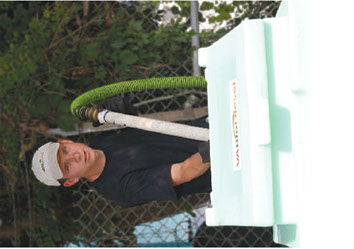About Virginia BioDiesel
Virginia Biodiesel Refinery is the state of Virginia’s oldest and largest biodiesel production facility. Founded in 2003, we have lead the mid-Atlantic region in providing top quality, locally sourced, sustainable, diesel fuel.
Having been at the forefront of the biodiesel industry, we have grown and evolved with the ever-changing biofuels market. Beginning with a few small stainless steel tanks, into a 5 million gallon a year, multi-feedstock capable, third-party quality assured refinery.
Our roots stem from a family run fuel oil business based in Kilmarnock, Virginia, with a mission to supply our local community with their essential energy needs. Providing biodiesel to our customers is a crucial step towards balancing our nation’s increasing energy requirements, while offering an eco-concious fuel alternative for the future generations.
Locally produced, distributed, sustainable, “green” energy is beneficial to our environment, and also our economy. These efforts were recognized in the spring of 2005, when President George W. Bush visited our refinery to introduce his 2006 energy bill.
Consistent with our company’s mission of providing the highest quality fuel for our customer’s, in 2012 Virginia Biodiesel became the first biodiesel refinery in the country to partner with ECO Engineers, a third-party, quality control management firm. As a result, we have been certified through the EPA, as a “tier 1” producer, giving our customer’s the guarantee of a quality made product.

On March 1, 2006, Doug Faulkner, managing partner of Virginia Biodiesel Refinery, passed away after a long illness.
It was the second anniversary of the plant's opening. Doug helped make biodiesel history when he hosted President George W. Bush on May 15, 2005. It was the first time a U.S. President visited a biodiesel plant. He had a great vision and helped to make a difference in the world of alternative energy.
Biodiesel
noun - a fuel comprised of mono-alkyl esters of long chain fatty acids derived from vegetable oils or animal fats, designated B100, and meeting the requirements of ASTM D 6751.
The EPA has recognized biodiesel’s environmental benefits by classifying it as an Advanced Biofuel, making biodiesel the only commercial-scale U.S. fuel produced nationwide to meet the agency’s advanced criteria.
According to the EPA, biodiesel reduces greenhouse gas emissions by at least 57 percent and up to 86 percent when compared to petroleum diesel – making it one of the most practical and cost-effective ways to immediately address climate change.
In addition, biodiesel sharply reduces major tailpipe pollutants from petroleum diesel, particularly from older diesel vehicles. This is important because the EPA has consistently cited diesel exhaust as one of the nation's most dangerous pollutants.
Biodiesel Blend
noun - a blend of biodiesel fuel meeting ASTM D 6751 with petroleum-based diesel fuel, designated BXX, where XX represents the volume percentage of biodiesel fuel in the blend.

BIODIESEL ON THE FARM
Fifteen years ago Soybean Associations across America and especially in Virginia, lead by a few farsighted farmers and a strong association, began the journey. Five years ago they were joined by fuel jobbers. Today Virginia boasts a new refinery and again is one of the early pioneers in the nation.
Farmers are becoming a strong customer base for biodiesel. Biodiesel provides an opportunity for farmers to create demand for the crops they grow through on-farm use. Farmers' commitment to biodiesel is reflected in their $25 million investment in the product through checkoff dollars.
The industry has encouraged all farmers to ask their fuel distributors to carry biodiesel in at least a two percent blend (B2). Building demand at a grass roots level is critical to the addition of biodiesel to terminals on a large national scale. Although biodiesel is compatible with existing diesel technology, including diesel tanks and other infrastructure, some petroleum distributors may choose to have separate tanks for biodiesel. Adding those tanks now to meet farmer demand will help ensure that the infrastructure is in place to meet future demand from the general public.
Biodiesel use benefits farmers. Farmers recognize that biodiesel is a high-quality product to use in their farm equipment. Even low blends of biodiesel like B2 and B5 offer exceptional lubricity, thus slowing engine wear and tear. Plus it is a cleaner-burning fuel that is friendlier to the user and the environment.
Farmers can get biodiesel anywhere.
Farmers should ask their local fuel distributor to carry biodiesel. Petroleum distributors are increasingly making it available to their customers as they realize that there is demand for the product.
Win - Win!
Farmers sell more beans and money stays in the commonwealth of Virginia rather than going overseas via importation. Every gallon purchased is one less "petrodollar" leaving the state. Please visit the Biodiesel.org website for more news and information on this product and how it can help your business and community.


SAFER & CLEANER MARKET FOR FLEETS
Operating costs for fleet managers are fixed and variable. Extending the life of an engine, adding lubricity to meet oncoming ultra low sulfur, and running cleaner engines results in lower operating costs.
Biodiesel also makes a tremendous parts cleaner. The product is easier on your hands and does not leave the typical odor of a solvent.
This product demonstrates its own quality. All of the reduction in carbon emissions, reduction in oil imports, and increased local economic activity come at no extra charge.
Biodiesel offers fleet operators a safer, cleaner alternative to petroleum diesel. Biodiesel is also a cost effective tool when complying with federal regulations. The Energy Conservation Reauthorization Act of 1998 allows federal, state and alternative fuel provider fleets who must comply with the Energy Policy Act (EPAct) and Executive Order 13149 to meet up to 50 percent of their light duty alternative fueled vehicle purchase requirements with biodiesel. The biodiesel fuel use credit gives fleets and covered persons, who are otherwise required under EPAct to purchase alternative fuel vehicles (AFVs), the option of purchasing and using 450 gallons of biodiesel in vehicles in excess of 8,500 lbs. gross vehicle weight instead of purchasing an AFV.
Biodiesel operates in conventional engines. Biodiesel blends operate in diesel engines, from light to heavy-duty, just like petroleum diesel. B20 works in any diesel engine with few or no modifications to the engine or the fuel system, and provides similar horsepower, torque, and mileage as diesel. Pure biodiesel is not compatible with natural rubber, sometimes found in pre-1994 vehicles. Because it is a solvent, it can degrade natural rubber hoses and gaskets, so those would need to be changed to more modern material if B100 is desired. This is not a problem with B20 blends (20 percent biodiesel/80 percent diesel) and below.
Biodiesel does not require special storage. In fact, in its pure form or in blends, biodiesel can be stored wherever petroleum diesel is stored, except in concrete-lined tanks. Acceptable storage tank materials include aluminum, steel, fluorinated polyethylene, fluorinated polypropylene and Teflon. The fuel should be stored in a clean, dry, dark environment. At higher blend levels, biodiesel may deteriorate natural rubber or polyurethane foam materials. Biodiesel also has a higher flash point, handles like diesel and is safe to transport. Users should be sure to verify compatibility with materials exposed to neat biodiesel.
Biodiesel costs rank well with other alternatives. In general, biodiesel blended at a 20 percent level with petroleum diesel costs approximately 20 cents per gallon more than diesel alone. Given the other advantages of biodiesel, though, an emission management system with biodiesel is a least-cost alternative. A study by Booz-Allen & Hamilton, Inc., found fleets using a 20 percent biodiesel blend would experience lower total annual costs than other alternative fuels.
Biodiesel exhaust is less offensive and reduces emissions significantly. Biodiesel is the first alternative fuel to have fully completed the Health Effects testing requirements of the Clean Air Act. The use of biodiesel in a conventional diesel engine results in substantial reduction of unburned hydrocarbons, carbon monoxide, and particulate matter. Emissions of nitrogen oxides are either slightly reduced or slightly increased depending on the duty cycle and testing methods. The use of biodiesel decreases the solid carbon fraction of particulate matter (since the oxygen in biodiesel enables more complete combustion to CO2), eliminates the sulfate fraction (as there is no sulfur in the fuel), while the soluble, or hydrocarbon, fraction stays the same or is increased. Biodiesel works well with new technologies such as catalysts, particulate traps, and exhaust gas recirculation. Soy biodiesel reduces carbon dioxide by 78% on a life cycle basis.
Please visit the Biodiesel.org website for more news and information on this product and how it can help your business and community.

SAFER & CLEANER MARKET FOR FLEETS
Operating costs for fleet managers are fixed and variable. Extending the life of an engine, adding lubricity to meet oncoming ultra low sulfur, and running cleaner engines results in lower operating costs.
Biodiesel also makes a tremendous parts cleaner. The product is easier on your hands and does not leave the typical odor of a solvent.
This product demonstrates its own quality. All of the reduction in carbon emissions, reduction in oil imports, and increased local economic activity come at no extra charge.
Biodiesel offers fleet operators a safer, cleaner alternative to petroleum diesel. Biodiesel is also a cost effective tool when complying with federal regulations. The Energy Conservation Reauthorization Act of 1998 allows federal, state and alternative fuel provider fleets who must comply with the Energy Policy Act (EPAct) and Executive Order 13149 to meet up to 50 percent of their light duty alternative fueled vehicle purchase requirements with biodiesel. The biodiesel fuel use credit gives fleets and covered persons, who are otherwise required under EPAct to purchase alternative fuel vehicles (AFVs), the option of purchasing and using 450 gallons of biodiesel in vehicles in excess of 8,500 lbs. gross vehicle weight instead of purchasing an AFV.
Biodiesel operates in conventional engines. Biodiesel blends operate in diesel engines, from light to heavy-duty, just like petroleum diesel. B20 works in any diesel engine with few or no modifications to the engine or the fuel system, and provides similar horsepower, torque, and mileage as diesel. Pure biodiesel is not compatible with natural rubber, sometimes found in pre-1994 vehicles. Because it is a solvent, it can degrade natural rubber hoses and gaskets, so those would need to be changed to more modern material if B100 is desired. This is not a problem with B20 blends (20 percent biodiesel/80 percent diesel) and below.
Biodiesel does not require special storage. In fact, in its pure form or in blends, biodiesel can be stored wherever petroleum diesel is stored, except in concrete-lined tanks. Acceptable storage tank materials include aluminum, steel, fluorinated polyethylene, fluorinated polypropylene and Teflon. The fuel should be stored in a clean, dry, dark environment. At higher blend levels, biodiesel may deteriorate natural rubber or polyurethane foam materials. Biodiesel also has a higher flash point, handles like diesel and is safe to transport. Users should be sure to verify compatibility with materials exposed to neat biodiesel.
Biodiesel costs rank well with other alternatives. In general, biodiesel blended at a 20 percent level with petroleum diesel costs approximately 20 cents per gallon more than diesel alone. Given the other advantages of biodiesel, though, an emission management system with biodiesel is a least-cost alternative. A study by Booz-Allen & Hamilton, Inc., found fleets using a 20 percent biodiesel blend would experience lower total annual costs than other alternative fuels.
Biodiesel exhaust is less offensive and reduces emissions significantly. Biodiesel is the first alternative fuel to have fully completed the Health Effects testing requirements of the Clean Air Act. The use of biodiesel in a conventional diesel engine results in substantial reduction of unburned hydrocarbons, carbon monoxide, and particulate matter. Emissions of nitrogen oxides are either slightly reduced or slightly increased depending on the duty cycle and testing methods. The use of biodiesel decreases the solid carbon fraction of particulate matter (since the oxygen in biodiesel enables more complete combustion to CO2), eliminates the sulfate fraction (as there is no sulfur in the fuel), while the soluble, or hydrocarbon, fraction stays the same or is increased. Biodiesel works well with new technologies such as catalysts, particulate traps, and exhaust gas recirculation. Soy biodiesel reduces carbon dioxide by 78% on a life cycle basis.
Please visit the Biodiesel.org website for more news and information on this product and how it can help your business and community.
x
Fueling the future
Support local business, create new jobs, invest in renewable fuels, reduce air pollution and diminish U.S. dependence on foreign oil.

VA Biodiesel is proud to be partnered with NWP Oil and Propane delivering all your fuel oil needs statewide. Based in Kilmarnock, VA, NWP Oil has been supplying Virginia residents and businesses for over 50 years. We can supply every blend of Biodiesel and Petroleum diesel from BIO Heat to B99.9. Deliveries are available in straight trucks or tractor trailers. NWP is also registered with the EPA, so we can offer competitive pricing by offering market solutions for the Renewable Energy Credits.
COOKING OIL RECYCLING PROGRAM
VA Biodiesel offers Virginia Restaurants and business a better alternative in the disposal of their used cooking oil. We are a local business dedicated to providing the highest quality of customer service, cleanliness, and pricing for your waste product. Customers will not only see a direct economical change when switching to VA Biodiesel, but they will also have the assurance that this product is being recycled in a sustainable way that actually yields local energy! All the cooking oil we collect goes directly into making our Biodiesel, which in turn, is fueling many of the diesel vehicles being used statewide today. We offer marketing tools using social media, stickers, and flyers, that will help set your business ahead of the rest.
FREE Collection Service
VA BioDiesel's Waste Oil Collection Division provides your business with local, fast, reliable and FREE service.
Customers are set up on a consistent collection schedule based on your gallons of waste.
Emergency Services guarantee and pick-up within 48 hours of notice.
We work to maintain a clean environment around your waste oil container.
We will handle all the arrangements necessary to transition your existing service to VA BioDiesel. New storage containers will be provided to your location that will accomodate your volumes of waste.
YOU Can Make the Difference
By signing up with VA BioDiesel Waste Oil Collection, you are making the difference. You are supporting local business, creating new jobs, investing in renewable fuels, reducing air pollution and diminishing dependence on foreign oil. We will work with you to market your GREEN company to your customers.







Virginia BioDiesel :: 7475 Ready Mix Drive, West Point, VA 23180 :: Ph: 804-843-9258 :: Fax: 804-843-9264 :: info@virginiabiodiesel.com









